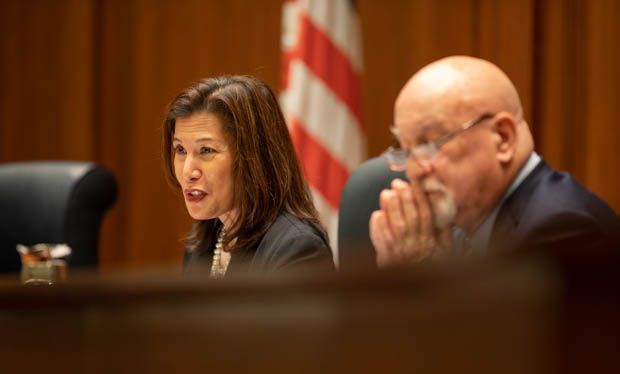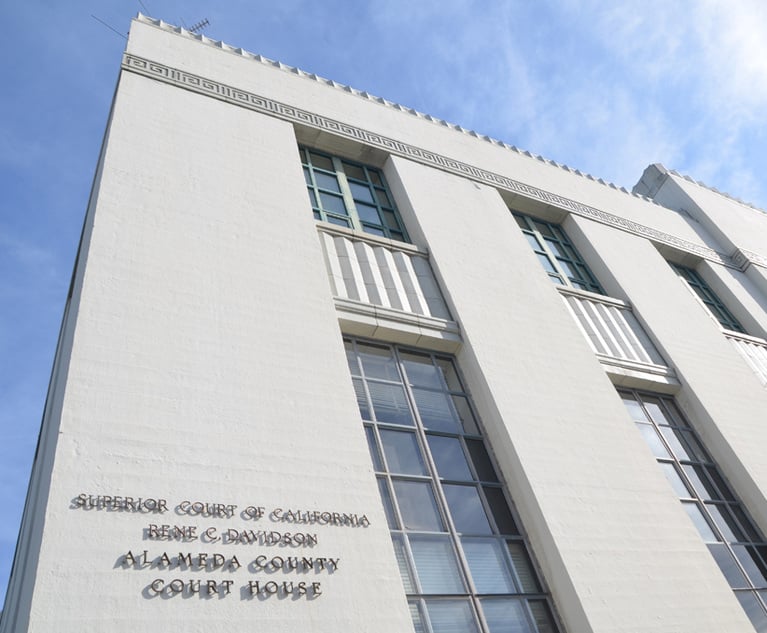Pandemic Threatens to Upend Legislation on Court Construction, State Bar
The state's financial drama has created incredible uncertainty for hundreds of bills introduced during much fiscally rosier times. The future of legislation addressing the courts, the state bar, independent contractors, privacy and the Commission on Judicial Performance is very much in doubt.
April 08, 2020 at 06:55 PM
5 minute read
 Chief Justice of California Tani G. Cantil-Sakauye and First District Court of Appeal Presiding Justice J. Anthony Kline. (Photo: Jason Doiy/ALM)
Chief Justice of California Tani G. Cantil-Sakauye and First District Court of Appeal Presiding Justice J. Anthony Kline. (Photo: Jason Doiy/ALM)
On Jan. 10, Chief Justice Tani Cantil-Sakauye hailed the governor's 2020-21 budget proposal, calling the $2 billion set aside for courthouse construction and new money for an envisioned court navigators program "welcome news" for a judicial branch still clamoring for funding a decade after the Great Recession.
Twelve weeks later those cheerful budget plans have all but evaporated. A budget reserve once expected to top $18 billion by summer 2021 will likely be drained as California binge buys medical equipment and copes with unemployment rolls that have ballooned by 2.3 million people in less than a month due to the coronavirus pandemic.
Gov. Gavin Newsom told reporters April 2 that his budget proposal "is no longer operable" and that "everything is on the table" to balance the state's ledger.
"I'm revising that budget, and we're putting out projections over the next three years that will be rather jaw-dropping in terms of the magnitude," Newsom told National Public Radio on Tuesday.
The state's financial drama, accompanied by a Legislature that will remain in recess until at least May 4, has created incredible uncertainty for hundreds of bills introduced during much fiscally rosier times. The future of legislation addressing the courts, the state bar, independent contractors, privacy and the Commission on Judicial Performance is very much in doubt.
Democratic legislative leaders have not announced publicly what their agenda will be when lawmakers finally return to Sacramento. But Republican Assemblyman Kevin Kiley tweeted Monday that "we're being told 75 percent of this year's bills will die without a vote."
Assemblyman Mark Stone, D-Scotts Valley, who chairs the Judiciary Committee, is carrying the annual bar licensing fee bill as well as legislation to address some of the criticisms the state auditor recently leveled at the Commission on Judicial Performance. The Judiciary Committee, which in a typical spring would be vetting hundreds of bills, has been unable to meet for weeks.
Stone "has not set any parameters or criteria for bills coming through the committee," his aide, Sean Porter, said Wednesday. "For his own bill package we are aware that due to the crisis the legislature will need to focus on being responsive to the current crisis, but at this time he has made no decisions on what he will continue pursuing."
Republicans, and a few Democrats, have introduced more than a dozen bills attempting to restrict the reach of last year's AB 5, the worker-classification legislation that codifies much of the Dynamex ruling. Many of those bills remained in doubt even before the pandemic, with the Assembly speaker voicing his support for the original legislation. Newsom, too, has said nothing publicly about backing away from the new law.
A clean-up bill by AB 5′s author, Assemblywoman Lorena Gonzalez, D-San Diego, would exempt journalists and some musicians. That legislation, too, is stalled during the current shutdown.
State and local stay-at-home orders were enacted as proponents of several initiatives were trying to finish collecting hundreds of thousands of signatures to qualify for the November ballot.
Backers of a measure to shield ride-hailing and delivery drivers from AB 5 announced March 27 that they had started submitting signatures to county elections offices.
Advocates of an initiative to raise a $250,000 cap on medical malpractice awards have until early June to turn in signed petitions. Jamie Court, president of the initiative-backing Consumer Watchdog, said April 1 that supporters had the necessary signatures and were "processing" them before giving the paperwork to elections officials.
 Alastair Mactaggart, San Francisco real estate developer. (Photo illustration: Jason Doiy/ALM)
Alastair Mactaggart, San Francisco real estate developer. (Photo illustration: Jason Doiy/ALM)Alastair Mactaggart, the main force behind the California Consumer Privacy Act, was also collecting signatures for a second data-protection ballot measure. A campaign spokeswoman did not return a message seeking comment.
State judiciary leaders had hoped 2020 was the year they would see enough budgeted money to build some of the dozens of new courthouses planned, but on hold, since the recession. The $2 billion in Newsom's budget was aimed at funding five projects a year for five years. Judicial Council officials had planned to unveil a new list of priority projects at a March public meeting. But that meeting was canceled as coronavirus cases spread across the state.
A budget administrator with the Judicial Council said the branch is gathering information about court costs while awaiting more guidance from the Department of Finance.
A memo issued this week by the Assembly Budget Committee said that lawmakers should expect to see a new budget proposal that reflects current spending levels.
"When we reconvene, we will no longer be able to consider new priorities and ideas from stakeholders, advocates and members, with the exception of COVID-19 related costs, wildfire prevention and homelessness funding," the memo said. "We may even need to revisit some reductions to existing state programs at that time, given the state's fiscal conditions."
Read more:
Orrick Cuts Salaries, Delays First-Year Associate Start Dates to 2021
With Bar Exam in Limbo, Momentum Builds for Supervised Practice Programs
In Criminal Trial Stalled Over Coronavirus, Some Parties Move Forward … Carefully
How COVID-19 Is Impacting California Courts: Roundup of Services
This content has been archived. It is available through our partners, LexisNexis® and Bloomberg Law.
To view this content, please continue to their sites.
Not a Lexis Subscriber?
Subscribe Now
Not a Bloomberg Law Subscriber?
Subscribe Now
NOT FOR REPRINT
© 2025 ALM Global, LLC, All Rights Reserved. Request academic re-use from www.copyright.com. All other uses, submit a request to [email protected]. For more information visit Asset & Logo Licensing.
You Might Like
View All

Fresh lawsuit hits Oregon city at the heart of Supreme Court ruling on homeless encampments
4 minute read

Trending Stories
Who Got The Work
J. Brugh Lower of Gibbons has entered an appearance for industrial equipment supplier Devco Corporation in a pending trademark infringement lawsuit. The suit, accusing the defendant of selling knock-off Graco products, was filed Dec. 18 in New Jersey District Court by Rivkin Radler on behalf of Graco Inc. and Graco Minnesota. The case, assigned to U.S. District Judge Zahid N. Quraishi, is 3:24-cv-11294, Graco Inc. et al v. Devco Corporation.
Who Got The Work
Rebecca Maller-Stein and Kent A. Yalowitz of Arnold & Porter Kaye Scholer have entered their appearances for Hanaco Venture Capital and its executives, Lior Prosor and David Frankel, in a pending securities lawsuit. The action, filed on Dec. 24 in New York Southern District Court by Zell, Aron & Co. on behalf of Goldeneye Advisors, accuses the defendants of negligently and fraudulently managing the plaintiff's $1 million investment. The case, assigned to U.S. District Judge Vernon S. Broderick, is 1:24-cv-09918, Goldeneye Advisors, LLC v. Hanaco Venture Capital, Ltd. et al.
Who Got The Work
Attorneys from A&O Shearman has stepped in as defense counsel for Toronto-Dominion Bank and other defendants in a pending securities class action. The suit, filed Dec. 11 in New York Southern District Court by Bleichmar Fonti & Auld, accuses the defendants of concealing the bank's 'pervasive' deficiencies in regards to its compliance with the Bank Secrecy Act and the quality of its anti-money laundering controls. The case, assigned to U.S. District Judge Arun Subramanian, is 1:24-cv-09445, Gonzalez v. The Toronto-Dominion Bank et al.
Who Got The Work
Crown Castle International, a Pennsylvania company providing shared communications infrastructure, has turned to Luke D. Wolf of Gordon Rees Scully Mansukhani to fend off a pending breach-of-contract lawsuit. The court action, filed Nov. 25 in Michigan Eastern District Court by Hooper Hathaway PC on behalf of The Town Residences LLC, accuses Crown Castle of failing to transfer approximately $30,000 in utility payments from T-Mobile in breach of a roof-top lease and assignment agreement. The case, assigned to U.S. District Judge Susan K. Declercq, is 2:24-cv-13131, The Town Residences LLC v. T-Mobile US, Inc. et al.
Who Got The Work
Wilfred P. Coronato and Daniel M. Schwartz of McCarter & English have stepped in as defense counsel to Electrolux Home Products Inc. in a pending product liability lawsuit. The court action, filed Nov. 26 in New York Eastern District Court by Poulos Lopiccolo PC and Nagel Rice LLP on behalf of David Stern, alleges that the defendant's refrigerators’ drawers and shelving repeatedly break and fall apart within months after purchase. The case, assigned to U.S. District Judge Joan M. Azrack, is 2:24-cv-08204, Stern v. Electrolux Home Products, Inc.
Featured Firms
Law Offices of Gary Martin Hays & Associates, P.C.
(470) 294-1674
Law Offices of Mark E. Salomone
(857) 444-6468
Smith & Hassler
(713) 739-1250






